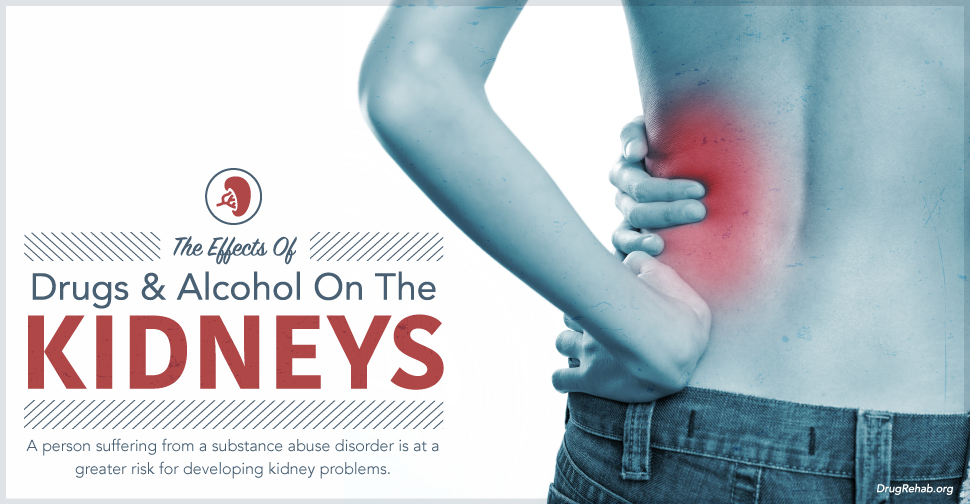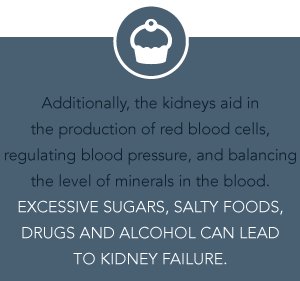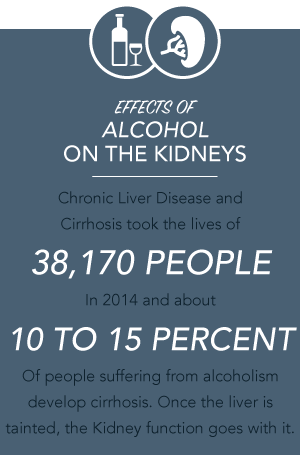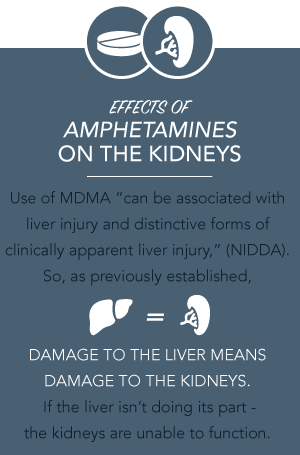
The kidneys are responsible for removing excess waste and fluids from the body through the urine. Every single drug a person uses goes through your kidneys. Drugs like heroin, alcohol, and inhalants can cause kidney damage and failure “from dangerous increases in body temperature and muscle breakdown,” National Institute on Drug Abuse. A person suffering from a substance abuse disorder is at a greater risk of developing kidney problems.
Our bodies are made up of tools for every step of processing food, developing muscle, pushing out toxins, and recovering from illnesses. When foreign substances like drugs and alcohol, serving little purpose for the body, are added to our daily intake–they can cause damage to our bodies built in filters known as the kidneys. The kidneys are responsible for removing excess waste and fluids from the body through the urine. Additionally, the kidneys aid in the production of red blood cells, regulating blood pressure, and balancing the level of minerals in the blood. Excessive sugars, salty foods, drugs, and alcohol can lead to kidney failure.

“Kidney failure, also known as end-stage kidney disease, occurs when the kidneys are no longer able to adequately remove waste from your blood and control the level of fluid in the body. Kidney failure can happen suddenly or gradually. People with kidney failure need dialysis or a transplant to stay alive,” (Victoria State Government).
What Are The Signs Of Kidney Failure?
So abusing drugs and alcohol can lead to kidney failure and kidney disease–but what does this mean? According to the Victoria State Government, the symptoms of kidney failure can include:
- Tiredness
- Loss of Appetite
- Difficulty Sleeping
- Headaches
- Lack of Concentration
- Shortness of Breath
- Nausea and Vomiting
- Changes in the amount and number of times urine is passed.
- Changes in the appearance of urine or blood in the urine.
- Puffiness in the Legs and Ankles
- Pain in the Kidney Area

Drugs That Cause Kidney Damage
Along with a tremendous list of adverse effects, drugs and alcohol can contribute to damage to vital body parts such as the liver, heart, lungs, brain, and kidneys. Since the kidneys are used for removing waste from the body, much like the brain, liver, and heart, they see every drug on its way through the body. Some of the drugs that can cause kidney damage are:
- Ibuprofen and Aspirin
- Heroin
- Cocaine
- Alcohol
- Phencyclidine–PCP
- Amphetamines
Effects Of Heroin On The Kidneys
Heroin can indirectly harm the kidneys… Heroin use can start off with something as small as irregular bowel movements, but prolonged use can lead to serious infection from repeated injections, high blood pressure (leading to kidney failure), severe withdrawals, panic attacks, and death. As heroin is cut and sold, it is often laced with other less dissolvable substances that can cause even further problems. According to the National Institute on Drug Abuse, this will “result in clogging the blood vessels that lead to the lungs, liver, kidneys, or brain.”
Short-term heroin use “can cause high blood pressure, stroke, heart failure and even death,” (National Kidney Foundation). Long-term heroin use can lead to liver and kidney disease–and even circulatory collapse and death.
Effects Of Alcohol On The Kidneys
The kidneys and the liver work together to process waste in the body; the waste products travel from the liver to the kidney and then out. Chronic Liver Disease and Cirrhosis took the lives of 38,170 people in 2014… And about 10 to 15 percent of people suffering from alcoholism develop cirrhosis. Once the liver is tainted, the kidney function goes with it. When the liver isn’t doing its job, the kidney has to work double-time and simply cannot keep up with waste management.

Chronic alcohol use has detrimental effects on the kidney which can lead to death. Alcohol use can also “disrupt the hormonal control mechanisms that govern kidney function. By promoting liver disease, chronic drinking has further, detrimental effects on the kidneys.” (National Institute on Drug Abuse) Alcohol abuse also leads to swollen kidneys, and larger than normal cells. Scientists discovered that under a microscope, after being fed alcohol, the kidneys had “increased amounts of protein, fat, and water.”(National Institute on Drug Abuse).
Effects Of PCP On The Kidneys
Phencyclidine (aka PCP, or “Angel Dust) is a hallucinogen which is typically ingested by snorting, smoking (by mixing with other drugs), or by injecting directly into the bloodstream. The kidneys are indirectly damaged through use of PCP, through high blood pressure. High doses of PCP lead to high blood pressure, which leads to damaged, hardened, or inflamed blood vessels in the kidneys; the kidneys then don’t get enough blood and are no longer supported. When the kidneys don’t get enough blood, they aren’t able to function as they should.
Effects Of Amphetamines On The Kidneys
Amphetamines can be used to treat attention deficit hyperactivity disorders and can include (but are not limited to) Adderall, Ritalin, methamphetamines, ecstasy (MDMA) and Concerta. Amphetamines work by stimulating the central nervous system and are often abused by people to get high. Drugs like Adderall are commonly used in the “higher education” community as a sort of “academic cocaine”–college students abuse such drugs to increase information retention and stay awake without feeling tired.

Use of MDMA “can be associated with liver injury and distinctive forms of clinically apparent liver injury,” (NIDDA). In some cases, with chronic use of MDMA, hepatitis C with fibrosis was discovered in the liver. So, as previously established, damage to the liver means damage to the kidneys. Each organ in the body is responsible for doing its part–the kidneys deal with filtering the blood and regulating electrolytes and maintaining fluid balance in the blood. If the liver isn’t doing its part–the kidneys are unable to function.
More On Substance Abuse And Addiction
Substance abuse adversely affects each part of the body–not just the heart, or the brain. Something that can be difficult to understand for a drug user, until it’s too late, is that regularly abusing drugs leads to addiction. Addiction can be a losing battle–and consequences to the liver and the kidneys can almost be expected as a result.
Treatment For Substance Use Disorders
Substance abuse disorders and addiction are treatable, even though they can seem hopeless, there is absolutely hope. Not every person who abuses drugs will have to get a kidney or liver transplant, but it’s always a possibility. If you are worried about your drug or alcohol use, or a person you know might be suffering from a substance abuse disorder–contact us today! Your body doesn’t have to suffer, call us for help.
For More Information Related to “The Effects of Drugs and Alcohol on the Kidneys” Be Sure To Check Out These Additional Resources From DrugRehab.org:
- How Long Does Alcohol Stay In Your Body?
- What Are The Side Effects Of Heroin Use?
- Impact of Chemical Abuse on the Body
- The Dangers Of Mixing Alcohol With Hydrocodone (Vicodin)
- What is Alcoholic Hepatitis?
Sources
National Kidney Foundation – Which Drugs are Harmful to Your Kidneys?
Center For Disease Control – Chronic Liver Disease and Cirrhosis
U.S. Library of Medicine – Phencyclidine Overdose

